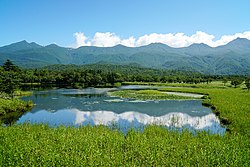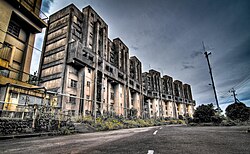Off the beaten track in Japan is your guide to interesting places in Japan that don't get many visitors (or at least many foreign visitors).






Understand
[edit]This is not really an itinerary — unless you have a couple of months and unlimited funds at your disposal — but rather a listing of interesting places scattered around Japan. Find the region you'll be visiting below, and see if you can work in a few of these into your own itinerary. From north to south:
- Shiretoko National Park — hot spring waterfalls, bears and rugged scenery
- Dewa Sanzan — the Three Holy Mountains of Dewa
- Hirosaki — the self-proclaimed Kyoto of the North
- Shimokita Peninsula — featuring a heavenly mountain valley and the Japanese entrance to Hell
- Shirabu Onsen — ski, hot springs and piles of snow away from it all, yet surprisingly accessible from Tokyo
- Hachimantai Plateau — Volcanic alpine meadow which bridges Akita and Iwate prefectures
- Odaiba — Tokyo's newest district on a reclaimed island in Tokyo Bay, very popular among Japanese but still under the radar for most foreigners
- Kawasaki — dull industrial Tokyo suburb known for the inimitable Iron Penis Festival (April) and its home shrine
- Oku-Hida Onsen Villages — luxurious hot springs nestled in the Japan Alps
- Ono — castles and temples without the tourists
- Sado Island — place of exile and gold mines, now featuring the yearly Earth Celebration and the self-proclaimed Alcohol Republic
- Sekigahara — Site of perhaps the most important battle in Japanese history, which enabled the victorious Tokugawa Ieyasu to come to power. Easy to get to from Kyoto and has an excellent museum and monuments to the battle. Trails between the monuments allow for visitors to hike the course of the battle in about 4-5 hours.
- Eiheiji Temple — head temple of the Soto Zen School of Buddhism. It was founded in 1244 by Zen Master Dogen.
- Kiso Valley — Area in southwestern Nagano Prefecture / eastern Gifu Prefecture. Contains a fairly well-preserved section of the old Nakasendo (mountain road used for traveling between Tokyo and Kyoto in olden times) as well as two checkpoint towns, Magome and Tsumago. Going between the two towns makes for a nice hiking day-trip. Onsen abound as well.
- Asuka — The nation's first capital, today visitors come to cycle trails around the ancient historic sites
- Mount Koya — secluded hilltop complex of Buddhist temples only a short hop away from Osaka or Kyoto
- Koka — small town near Kyoto famous for its ninja history, unique ceramics and location on the Tokaido Road
- Ise Grand Shrine — Recognized as Japan's holiest and most significant shrine, said to enshrine the supreme Shinto deity. The area is also home to the "Wedded Rocks" as well as Toba, the town where pearl cultivation was invented.
- Iga — along with Koka, this city is where the art of ninjutsu originated. Every year in April, the town conducts a "Ninja fest" where people can come and dress up in rather authentic ninja garb and wander around town. There is a "ninja house" as well, full of trap doors and other ninja devices.
- Yoshino — known throughout Japan as the best place in the nation for cherry blossom viewing, with over 30,000 trees, south of Nara City.
- Akiyoshidai — Home to Japan's largest plateau and largest cave.
- Takahashi — A beautiful castle town surrounded by mountains, it contains the majestic Bitchu Matsuyama Castle, one of Japan's few remaining original castles, as well as the highest.
- Onomichi — A pleasant little temple town home to many Japanese authors. Also the starting point of the Shimanami Kaido, a 70-km journey across the Seto Inland Sea that is considered Japan's best cycling route.
- Tsuyama — A beautiful historic town offering Kakuzan Park, one of the best places in the region to view cherry blossoms in the spring, Shurakuen Garden, and Joto Street, a well-preserved historic road located along the pilgrimage route to Izumo Shrine.
- Bizen — The city where some of Japan's best swords and pottery originated and continue to be produced today.
- Daisen — A city most famous for Mount Daisen, a great place in the West to hike, climb, and skii (in the wintertime). A walk through the trails to Daisen-ji Temple is quite peaceful and serene.
- Misasa — Radium spa and home to the mysterious Mitokusan Sanbutsuji Nageiredo, a temple built into a cliff.
- Oboke — Japan`s best white-water rafting. The Yoshino river is a fantastic place for rafting.
- Iya Valley — one of Japan's Hidden Valleys, known for its vine bridges
- Mount Ishizuchi — Shikoku's highest mountain, climbed with iron chains
- Uwajima — a nondescript little rural town with an original castle, bouts of bull sumo and a shrine devoted to fertility & phalli
- Kochi — home to Kochi Castle, one of Japan's original castles, and the only one with its original main keep and palace buildings still standing

- Ikeshima — Former coal mining island now catering to intrepid ruin explorers
- Karatsu — A small town where the famous Karatsu pottery originates
- Mt. Aso — A humongous volcanic caldera smack in the middle of Kyushu. Hiking and onsen opportunities abound.
- Yakushima — A mountainous, rain-soaked island, home to giant cedars thousands of years old.
